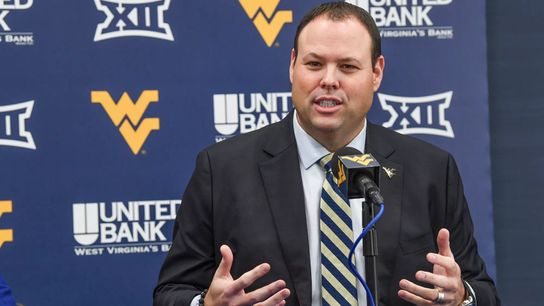Meeting the murky elements of the House Settlement and impending July 1 deadline head-on, West Virginia Athletics Director Wren Baker is candidly discussing college athletics' new world.
Sitting down for a series of discussions with his department's athletics communications team in a segment West Virginia is billing "Money Matters," Baker covers a wide array of pertinent elements in Part I -- including his belief that some college leaders are ready to accept a collective bargaining component with student-athletes. He also says all ticketed sports at West Virginia will receive some corresponding portion of revenue-sharing funds; the House Settlement stipulates schools that opt in to the agreement can share up to $20.5 million in revenue with student-athletes beginning July 1; it's a number guaranteed to increase by at least 4% year over year for the duration of the 10-year agreement.
"I think the criticism of the system that we have developed is that student-athletes didn't have a voice in it," Baker says in the video, "but I think the truth of the matter is, if they were employees and we were collectively bargaining, I'm not sure they would have walked away with as many benefits as they are walking away with in this settlement; the plaintiff's counsel was really good at fighting for the student-athletes.
"There is a segment of athletic directors that would be willing to view student-athletes as employees, but it's a really tough precedent for campuses, because then you start running the risk of [raising conversations to ask] 'Okay, what about the band students or the theater students and all these different clubs and organizations you have?' What ends up happening to club and (recreational) sports?"
In discussions last month at the National Football Operations Organization's annual conference in Frisco, Texas, an NCAA emissary noted the fact that he believed the NCAA was more than 75 years too late to handle collective bargaining or classify student-athletes as employees -- all because liability costs now are too prohibitive.
"I don’t think that’s going to happen because (with) insurance becomes liability claims. Go back to 1948 [when they could have done this]," he said. "If you move into that space, football programs are going to disappear because at some point (athletes'0 long-term disability will drain the resources of the institution. Liability claims (will run up costs).
"I think they [student-athletes in most sports] are operating right now as employees. If we look at demands on student-athletes, if that conversation goes forth, I think the next movement or next major lawsuit is they're going to want that insurance protection as well. If they fight for that, I think that's where we will end up going."
While Baker, a veteran college administrator with previous stops as the No. 2 A.D. at both Missouri and Memphis, as well as running the show at North Texas prior to his arrival at West Virginia two years ago, is open to a "collective bargaining-type conversation," he doesn't think a full-scale employment model is best for collegiate athletics.
"Why are you coming to college?," asked Baker, who earlier this year brought back the once-supremely popular Rich Rodriguez to again run Mountaineers football. "You are coming to college because of the experiences and the relationships you make, and the development that you experience as a person going to a new place and being on your own.
"If you are diminishing all that, what's the point? If we can find a way in some kind of federal bill to have a collective bargaining-type of conversation that doesn't require employment, which doesn't currently exist, that could ultimately help us get there."
While Baker did not term the House Settlement as a cure-all measure that's going to save collegiate athletics without further modifications, he did indicate it gives collegiate athletics a chance to recalibrate what had become a system that "was not sustainable."
"What we had was not sustainable and is the reason why some of the richest athletics programs in the country were having $30, $40 million deficits and having to take out loans from campus [rather than being self-sustaining athletics departments]," Baker said. "This gives us a model that we can kind of build around and build a sustainable economic model, build a model that hopefully allows us to continue to offer broad-based programs with many sports and great experiences across those sports."
Baker's full conversation can be found here: West Virginia A.D. Baker Tackles House Settlement Topics
